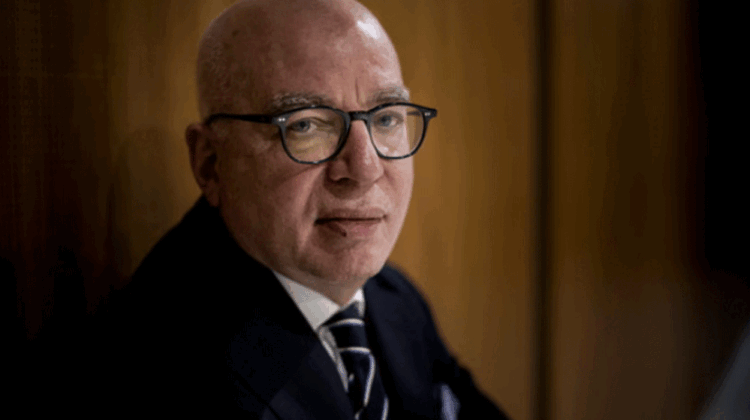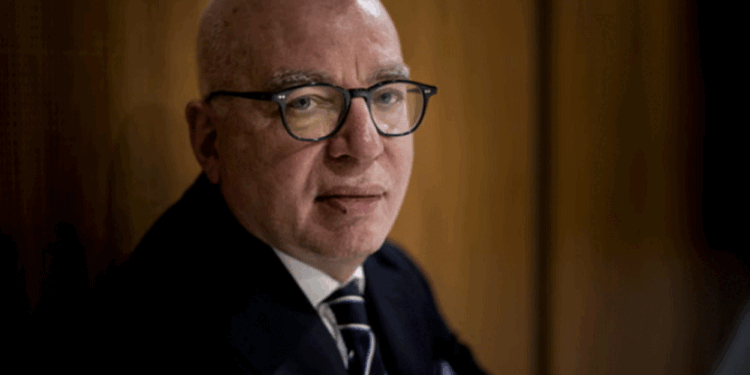
Order Michael Finch’s new book, A Time to Stand: HERE. Prof. Jason Hill calls it “an aesthetic and political tour de force.”
Sign up to attend Michael’s talk in Los Angeles on Thursday, November 20: HERE.
His name is Michael Wolff, and he’s been called “the It Boy of New York media.” For decades now (he’s 72), he’s been busy keeping his name out there. But the kind of attention he’s been receiving lately, which has made him more famous than ever – not just in New York, but around the world – isn’t exactly the kind he’s lusted after. As Holly Golightly so wisely observes in Breakfast at Tiffany’s: “There are certain shades of limelight that can wreck a girl’s complexion.”
What happened to propel Wolff into the headlines? On November 12, the House Oversight Committee released a trove of Jeffrey Epstein-related emails, some of which show that in 2016 Wolff provided advice to Epstein, who in 2008 had already been convicted of solicitation of a minor for prostitution. At the time of their email exchanges, the author James Patterson had just published a derogatory book about Epstein, and Wolff advised Epstein that Trump’s ongoing presidential campaign provided “an ideal opportunity” to counter Patterson’s charges.
“It’s a chance to make the story about something other than you,” counseled Wolff in one email, “while, at the same time, letting you frame your own story. Also, becoming an anti-Trump voice gives you a certain political cover which you decidedly don’t have now.” Several days later, Wolff suggested that Epstein might “come forward this week and talk about Trump in such a way that could garner you great sympathy and help finish him.” Still later, he proposed that Epstein blackmail Trump.
Rarely do legacy-media lefties criticize one another in public. But Wolff’s grotesque, cynical collaboration with Epstein was so egregious that Ed Pilkington, the Guardian’s man in America, felt moved to go after him the other day, maintaining – quite rightly – that Wolff’s email exchanges with Epstein are “not the stuff of journalistic codes of conduct.” Generally speaking, explains Pilkington (perhaps unnecessarily), reporters “are not encouraged to give strategic PR advice to public figures about whom they might be writing, whether or not their interlocutor is a convicted sex trafficker.”
Another prominent newsman, Isaac Saul – who has contributed to CNN, among other media – weighed in as well, charging that Wolff had been “literally game planning with Epstein about how to defend himself in the media. This is journalism?”
To be sure, it’s rather rich for scribblers at the Guardian and CNN to be preaching about journalistic codes: they aren’t exactly upstanding journalists themselves, if by journalist you mean someone who’s all about the facts. No, these days such people are spinmeisters, promoting the progressive narrative and smearing actual truth-tellers as conspiracy theorists.
Still, Pilkington and Saul had a valid point: even by their low standards, Wolff crossed the line.
Who is Michael Wolff? If you live west of the Hudson, you may never have heard of him. On the other hand, if you’ve spent any part of your life during the last few decades as a professional scribbler in Manhattan, he’s been an inevitable feature of the local cultural landscape. From 1998 to 2004, he wrote a column for New York Magazine. It was a perfect fit: he’s an obnoxious, superficial piece of work, and New York is an obnoxious, superficial magazine that has long been aimed at obnoxious, superficial readers – mainly young Manhattanites who are either upscale or upwardly mobile.
Wolff’s New York “Media Life” columns about media machers – among them superagent Mike Ovitz, NBC honcho Jeff Zucker, Meet the Press host Tim Russert (“the most powerful journalist in Washington”), philosopher-pundit Andrew Sullivan (who “believes that he is the most significant gay public intellectual in America today”), mogul-turned-mayor Michael Bloomberg, New York Times house economist Paul Krugman, boy editor Adam Moss (“a wunderkind of the last great magazine age”), and lifelong LBJ biographer Robert Caro – were as entertaining as they were instantly forgettable: juicy, shallow profiles in power in which Wolff virtually never brought any ethical or aesthetic judgment to bear on anything.
The column he wrote about 9/11 demonstrated for all time the insufficiency of his standard approach to his subjects when those subjects go beyond mere gossip. His take on New York’s most horrific day was that while the terrorists were presumably targeting America’s “redneck militarism,” it struck at “the world’s greatest liberal city,” which was “as far from American gung-ho-ism as any place can be”; for Wolff, the possibility that New York would become “the great symbol of Americanism” was supremely ironic. Did the destruction of the Twin Towers move him, in the weeks and months that followed, to learn more about Islam, so that he might use his valuable column space to illuminate that terrible event for his readers? Of course not.
Twenty-one years ago, Michelle Cottle penned a definitive portrait of Wolff for the New Republic. Calling him “one of the most powerful, most talked about, and most hated figures in New York media,” Cottle noted Wolff’s penchant for “busting embargoes and burning sources by putting off-the-record comments on the record.” He was, she wrote, “the quintessential New York creation, fixated on culture, style, buzz, and money, money, money.” And here’s a sentence that might be the key to his sordid relationship with Epstein, a relationship that, when the day comes, will likely be mentioned in the very first sentence of his Times obituary: “For Wolff, nothing is more erotic than a multibillionaire.”
Four years ago, I wrote a review of some two dozen new books about Donald Trump. The books were all relentlessly negative and awash in disinformation: indeed, it was as if the authors – including such slimy legacy-media fixtures as Jeffrey Toobin, Rick Wilson, Jim Acosta, David Frum, Jonathan Karl, and Bob Woodward – were vying to see who could be the most deceitful and derogatory about the man who’d just left the White House. But even in this crowd of trashy Trump-haters, one stood out. As I put it:
Veteran Manhattan media columnist Michael Wolff is a case unto himself. A serial fabulist who scorns journalistic conventions like factual accuracy or attribution of quotes, he’s considered dishonest even by dishonest journalists. For decades, he’s been accused of quoting off-the-record comments and inventing entire scenes out of whole cloth for his columns in New York magazine and elsewhere.
Given that Wolff’s main beat isn’t politics but the media, it wasn’t surprising that the two books of his that were under review, Fire and Fury: Inside the Trump White House and Siege: Trump under Fire he “treated Trump mainly as a media phenomenon,” giving less space to his domestic and foreign policies than to his relationships with the likes of Tucker Carlson and Joe Scarborough. Unsurprisingly, since Wolff is better known for his arresting caricatures of public figures than for his political or social or character analysis, it wasn’t surprising that his portrait of Trump was, as I wrote, “cinematically vivid, and alarming” – the forty-fifth president came off looking like “a cartoon clown” – but was “not remotely convincing.”
But then, being convincing has never been remotely as important to Wolff as being colorful. And he’s always been far less interested in probing behind the surface of wealth and celebrity than in bathing in the incandescent glow of passing fame. The revelation of his crass, clandestine collusion with Jeffrey Epstein is, then, anything but a surprise; it’s the all-too-predictable culmination of a decades-long writing career during which he’s obsessively chronicled the lifestyles of the rich and renowned without ever consulting a moral compass. That the international media, after all these years, have finally gotten this sleazeball’s number is the very definition of poetic justice.

















